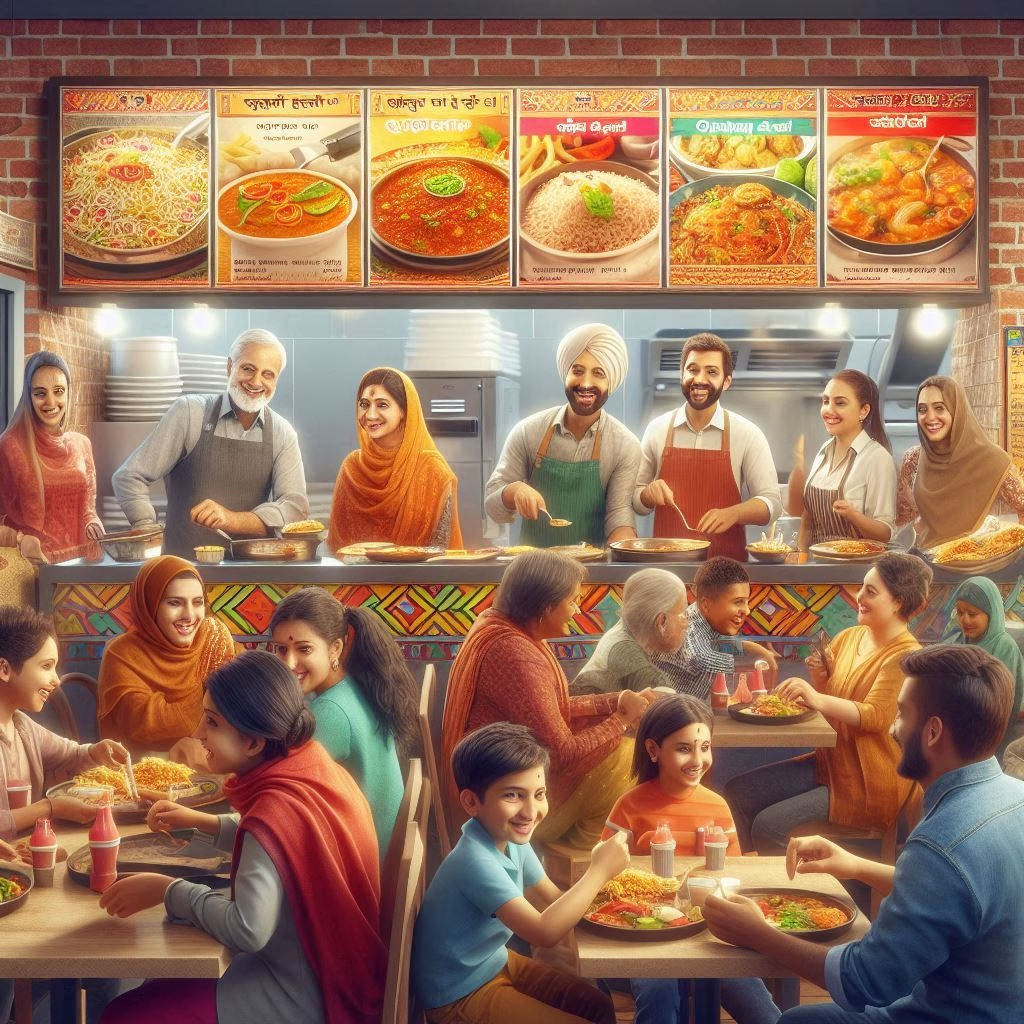If you’re thinking about starting something of your own, food business ideas are a great place to begin, especially in India. Our country loves food. From homemade snacks to restaurant meals, the demand is huge and keeps growing every year.
Nowadays, consumers are seeking anything from nutritious meals and home-cooked tiffin services to gourmet sweets and regional specialities. And the best part is that most of these food business ideas require little or no investment to initiate.
You do not require a large shop or an elaborate kitchen. A small setup at home can earn you well. Owing to platforms such as Swiggy, Zomato, Zepto, and Blinkit, meeting customers has become convenient, even if you are just beginning.
Read: Top Small Manufacturing Business Ideas
In this article, our industry experts will walk you through the best food business ideas in India. You will also learn how to pick the right one based on your budget, skills, and goals. Whether you’re a home cook, student, cloud kitchen owner, or someone dreaming of a restaurant, there’s something here for you.
Table of Contents
Why Start a Food Business in India?
A. Rapid Growth of the Food Services Sector
India’s food services sector is growing fast. As of 2024, it stands at ₹5.69 trillion and is expected to touch ₹7.76 trillion by 2028 at a CAGR of 8.1%. This is driven by urbanisation, increasing incomes, and evolving consumer tastes.
B. Huge Employment Opportunities
The industry is India’s second-largest employer, employing 8.5 million individuals in 2024. Industry pundits anticipate this number to rise to 10.3 million in 2028. It reflects the industry’s prominence in the economy.
C. Digital Transformation and Online Delivery Boom
The emergence of food delivery platforms like Swiggy and Zomato changed the dynamics of the way food businesses operate in India. It was estimated that 66 million food delivery platform users were based in urban India in 2024, an indicator of the shift towards digital ordering and convenience.
D. Low Entry Barriers for Small Entrepreneurs
It is not always necessary to invest heavily in starting a food business. Home-based businesses such as tiffin services, cloud kitchens, or snack manufacturing can be started with low capital. The organised food services market is likely to grow at a CAGR of 13.2%, which suggests a positive climate for new players.
E. Government Support and Positive Policies
The Indian government encourages the food sector with efforts such as the Pradhan Mantri Formalisation of Micro Food Processing Enterprises (PMFME) Scheme, which focuses on developing the competitiveness of the current individual micro-enterprises in the unorganised part of the food processing business.
Best Food Business Ideas in India (Categorised by Investment)
Whether you want to start small from your home kitchen or dream of launching a big brand, there’s no lack of lucrative food business ideas in India. Following is a list of them, which are categorised from low to high investment.
Low-Investment Food Business Ideas (Under ₹1 Lakh)
If you wish to begin a food business with a low investment, several opportunities can be started with minimal capital and simple kitchen gear. These are ideal for home cooks, students, or anyone who wishes to begin a small-scale food business on a small budget.
1. Tiffin Service

Most office workers and students seek fresh, home-made food. Begin by making 10–15 tiffins a day in your home kitchen. Utilise WhatsApp or local delivery apps to reach customers close by. Utensils, groceries, and simple packaging containers are required.
How to start:
– Offer 2-3 meal options (veg/non-veg, North/South Indian)
– Set up the kitchen by buying basic utensils, a gas stove, and storage containers
– Use affordable yet hygienic tiffin boxes or disposable containers
– Promote via WhatsApp, Facebook groups, and local offices
– Start with self-delivery or hire a part-time delivery person
2. Home-made Pickles and Chutneys
Pickle-making is a highly traditional activity in most Indian homes. Begin by making small quantities using homemade recipes. Pack in glass jars or food-grade pouches. Start selling to friends, neighbours, or nearby shops and grow from there.
How to start:
– Choose unique recipes like mango pickle, garlic chutney, lemon achar
– Buy Ingredients in Bulk, such as spices, oil, and raw materials, from wholesale markets
– Use glass jars or food-grade plastic pouches for packaging
– Promote via local grocery stores, WhatsApp orders, Instagram/Facebook
– Go for FSSAI Basic Registration
3. Home Bakery

If you have a liking for baking brownies, cookies, or cakes, you can begin your home bakery. A good oven, measuring equipment, baking trays, and ingredients will be required. Accept orders via Instagram or neighbourhood WhatsApp groups and deliver locally.
How to start:
– Buy Essential Equipment like an oven, mixing bowls, measuring tools
– Start with Simple Products such as cakes, cookies, cupcakes, and brownies
– Take Pre-Orders using Instagram, WhatsApp, or local groups
– Self-deliver or partner with hyperlocal delivery services
– Scale Up by offering themed cakes for birthdays/weddings
4. Biryani Stall
Biryani has mass appeal across India with high demand. A single pot can yield 50+ servings with 60-70% profit margins. Some of the most popular types are chicken biryani, paneer biryani, vegetable biryani, mutton biryani, and Hyderabadi biryani.
How to start:
– Get a portable gas stove and large handi (₹15k-25k)
– Source quality rice, meat & spices in bulk
– Set up near offices/colleges for lunch crowds
– Offer veg/non-veg options with raita
5. Tea Stall or Tapri
A tea stall near colleges, offices, or busy markets can attract daily customers. You’ll need a small roadside setup, a gas stove, a table, and raw materials like tea leaves, milk, sugar, and cups. A rented cart or stall space can keep costs low.
How to start:
– Find a Good Spot near colleges, offices, or busy markets
– Develop a basic Setup with a gas stove, a kettle, disposable cups, and a small table
– Create menu Ideas like Masala chai, coffee, biscuits, and simple snacks
– Check local municipal rules for street vending
6. Pav Bhaji Stall
Though these are South Indian foods, people throughout the nation like to have both as a main course or tiffin. Also, these come under the healthy food segment with less oil and spices. Low-cost ingredients (potatoes, peas) and quick preparation make it ideal for evenings. You can sell 100+ pav bhaji plates daily in busy areas.
How to start:
– Buy tawa, pav warmer, and ingredients (₹10k-20k)
– Use butter generously for rich flavor
– Position near parks or railway stations
7. Roasted Snacks & Namkeen Making
You can prepare healthy snacks such as roasted peanuts, makhana, or chana at home. Begin with small machines or manually. Pack hygienically and sell through local shops, offices, or housing societies.
How to start:
– Select Snacks like roasted peanuts, makhana, chana, or spicy mixtures
– Buy Raw Materials such as wholesale grains, spices, and oils
– Procure attractive, airtight pouches for packaging
– Sell to local shops, gyms, offices, or online via Instagram
8. Momo or Chaat Stall
Street foods such as momos, golgappa, or bhel puri are always needed. With a mini food cart and small cooking facilities, you can begin this business along with schools, markets, or IT parks. You might also require a simple local food vendor license.
How to start:
– Choose a location that is near schools, markets, or corporate hubs
– Buy equipment like a steamer for momos, a chaat preparation table
– Create variations such as veg/non-veg momos, dahi puri, sev puri
– Check local food vendor regulations
9. Homemade Chocolates

You can learn to make basic chocolate at home with the help of moulds and simple tools. Pack them well and sell for festive occasions, birthdays, or return gifts. You can begin taking orders online and providing doorstep delivery.
How to start:
– Learn Basic Chocolate Making through online tutorials or short courses
– Buy Moulds & Ingredients like cocoa, milk powder, nuts, and packaging
– Sell online through Instagram, WhatsApp, or gift shops
– Get festive and wedding Orders of customised chocolates for events
10. Papad and Fryums Making
This homemade food business is particularly in vogue in villages and semi-villages. You can produce different varieties of papads out of pulses and spices. Sun-dry and pack in plastic bags to retail in bulk or to local shops.
How to start:
– Choose types like moong dal papad, sabudana papad, masala fryums
– Make arrangements to sun-dry and store
– Sell to local grocery stores, supermarkets, or online
11. Cold Sandwich and Salad Delivery
Urban consumers are searching for healthy food. You can make fresh sandwiches or salads at your home and deliver them during lunchtime to offices or homes. You’ll require basic equipment such as knives, chopping boards, storage containers, and good hygiene.
How to start:
– Plan menu offerings like veg/non-veg sandwiches, quinoa salads
– Use fresh ingredients and proper storage
– Develop delivery models like office lunch subscriptions or gym partnerships
Read: Best Food Delivery Businesses to Start
12. Mini Catering for Home Functions
Start by catering small home events like poojas, birthday parties, or get-togethers. Prepare meals for 15–30 people using your home kitchen. You’ll need extra utensils, a helper (if needed), and reliable delivery arrangements.
How to start:
– Start small by catering to 15-30 people for home events
– Buy equipment like extra utensils, portable gas stoves
– Do marketing through WhatsApp groups, Facebook, and local event planners
Medium-Investment Food Business Ideas (₹1 Lakh to ₹10 Lakhs)
If you have a slightly bigger budget and are ready to take your food venture beyond home kitchens, these ideas offer greater growth and income opportunities. Most of them can be started from rented spaces, shared kitchens, or small outlets.
13. Cloud Kitchen

A cloud kitchen is a delivery-only food business. You don’t need a dining area—just a functional kitchen. Rent a small space, register your food business, get on platforms like Zomato and Swiggy, and start preparing meals for online orders. Focus on a specific cuisine or niche like biryani, thalis, or healthy bowls.
How to start:
– Rent a small kitchen (100–200 sq ft)
– Register with FSSAI and food delivery apps
– Hire 1–2 helpers or cooks
– Start with a limited menu and offer combo meals
14. Small Catering Service
You can start catering for birthday parties, office lunches, small weddings, or community functions. A team of 2–4 people can handle orders for 30 to 100 people.
How to start:
– Rent a commercial kitchen or use your own if big enough
– Hire part-time helpers for events
– Invest in big utensils, packaging trays, and delivery vans if needed
– Promote locally through referrals and Google My Business
15. Juice & Smoothie Bar
Fresh juice shops and smoothie counters are trending, especially near gyms, schools, and markets. You can offer a menu with fruit juices, shakes, detox drinks, and energy boosters.
How to start:
– Rent a 100 sq ft shop or set up a kiosk
– Buy a commercial juicer, refrigerator, and blender
– Use good-quality fruits and maintain hygiene
– Add customisations like protein shakes or seasonal specials
16. Regional Food Stall or Kiosk
Serve regional favourites like dosa, idli, vada pav, litti chokha, momos, or parathas from a food stall or kiosk in busy areas.
How to start:
– Choose a location with high footfall (metro station, market, etc.)
– Invest in signage, uniforms, and a consistent taste
– You’ll need a vendor license and basic FSSAI registration
– Keep prices affordable and offer fast service
17. Small Café or Tea Lounge

Start a themed café serving tea, coffee, snacks, and comfort food. You can offer board games, books, or co-working spaces to attract young people.
How to start:
– Rent a 300–500 sq ft space near colleges or offices
– Furnish with tables, chairs, and cosy lighting
– Offer a mix of hot beverages and finger food
– Market through Instagram and local collaborations
18. Bakery Outlet
If your home bakery is growing, open a small outlet to serve walk-in customers. You can add bread, desserts, puffs, and beverages.
How to start:
– Set up a kitchen with an oven, fridge, and display racks
– Hire 1–2 bakers or helpers
– Use POS software for billing
– Decorate with a modern look and focus on packaging
19. Snack Manufacturing Unit
Start producing namkeens, chips, or regional snacks like murukku, chakli, or banana wafers. You can supply to grocery stores, supermarkets, or resell through distributors.
How to start:
– Rent a small industrial kitchen or unit
– Buy machines for frying, packing, and sealing
– Focus on one product line initially
– Print your brand labels and get an FSSAI license
20. Mobile Food Cart

Unlike a traditional food truck, a mobile cart needs less space and costs. You can sell sandwiches, rolls, Chinese, or Indian fast food on wheels.
How to start:
– Buy a customised cart with storage and cooking setup
– Set up near college campuses or IT parks
– Offer combo meals and quick service
– Use gloves, hairnets, and follow hygiene standards
21. Meal Subscription Service
This model works great for office workers, students, or health-conscious individuals who want daily meals delivered to their doorstep. You can offer weekly or monthly plans for lunch, dinner, or diet-based meals.
How to start:
– Build a basic website or WhatsApp ordering system
– Rent a kitchen or run from home initially
– Partner with delivery agents or use your own team
– Offer flexible subscription plans (weekly/monthly)
22. Ethnic Sweets & Snacks Shop
India has a huge market for regional sweets like rasgulla, kaju katli, peda, and laddoo. Combine it with savoury items like samosa, kachori, or chakli to attract a wider audience.
How to start:
– Set up a 200–300 sq ft shop in a residential area
– Hire a trained halwai or snack maker
– Invest in counters, weighing scales, and packaging
– Focus on festive sales, bulk orders, and local events
High-Investment Food Business Ideas (₹10 Lakhs & Above)
If you’re serious about building a large-scale, brand-driven food business, these ideas can help you create long-term assets. With the right planning, location, and marketing, high-investment food ventures offer strong returns and even franchise potential in India.
23. Quick Service Restaurant (QSR)

QSRs offer fast food like burgers, pizzas, wraps, and more in high-footfall areas. With a strong brand identity, they attract students, office-goers, and families.
How to start:
– Lease a 500–800 sq ft outlet in a mall, high street, or near offices
– Hire trained staff and chefs
– Invest in branding, uniforms, and POS systems
– Offer dine-in, takeaway, and delivery
24. Multi-Cuisine Family Restaurant
A full-scale restaurant serving North Indian, Chinese, South Indian, or Continental cuisine can be a hit in residential and urban areas.
How to start:
– Rent or buy a 1000+ sq ft space with seating
– Hire chefs, servers, and a manager
– Register under FSSAI and the local municipal authority
– Offer a comfortable dining experience and consistent taste
25. Food Truck Business
Food truck is a trendy business for metro cities. It offers mobility and flexibility. Popular food options include burgers, momos, rolls, and fusion snacks.
How to start:
– Buy a customised truck with a kitchen setup
– Get RTO permission and FSSAI registration
– Choose fixed or rotating parking spots in high-traffic areas
– Promote on Instagram and at food festivals
26. Ice Cream Parlour Franchise
Opening an ice cream parlour franchise of brands like Naturals, Amul, Cream Stone, or Baskin-Robbins gives you a ready-made business model with strong customer trust.
How to start:
– Choose a reputed ice cream franchise
– Invest in franchise fees, interiors, and equipment (₹10–25 lakhs)
– Set up near markets, schools, or malls
– Follow brand SOPs and quality control
27. Flour Mill (Atta Chakki)
Flour mill or Atta Chaki is a profitable business in our country. However, apart from wheat flour, you can produce a lot of products like Sattu, Gram Flour (Besan), Rawa (Suji), etc. These products have sufficient domestic demand. Additionally, there is export potential.
How to start:
– Install the machine in a residential area
– Offer home delivery subscriptions
28. Organic or Healthy Food Café
This niche is growing rapidly in urban India. You can serve salads, smoothie bowls, keto meals, vegan foods, and cold-pressed juices.
How to start:
– Set up a stylish café in a metro or Tier-1 city
– Partner with dietitians or fitness influencers
– Source organic or locally grown ingredients
– Build an Instagram-friendly ambience and menu
29. Central Kitchen & B2B Food Supply
You can supply packaged meals or snacks to offices, events, hospitals, or food delivery startups. A central kitchen can serve multiple locations or brands.
How to start:
– Rent a 1000+ sq ft industrial kitchen with proper licenses
– Hire trained cooks and packing staff
– Use automated machines for large-scale production
– Offer fixed contracts to corporate clients or aggregators
30. Microbrewery or Restobar
Popular in urban India, restobars and microbreweries offer food, drinks, and live music experiences. Cities like Bengaluru, Pune, and Gurugram are hotspots.
How to start:
– Secure a large property (2000+ sq ft) with proper licenses
– Apply for liquor license (costly & city-specific)
– Hire experienced chefs, bartenders, and a marketing team
– Offer craft beers, cocktails, and gourmet food
31. Food Franchise Outlet
Buying a franchise of a reputed food chain like Domino’s, Subway, Wow! Momo, or Haldiram’s, reduces risk and ensures good footfall.
How to start:
– Choose a franchise with a good support system
– Invest ₹15–₹40 lakhs depending on the brand and location
– Get trained by the parent brand
– Focus on location selection and maintaining quality
Read: Best Food Franchise in India
Frequently Asked Questions
What is a Food Business?
The food industry covers a wide range of products like fruit and vegetables, meat and poultry, milk and dairy products, alcoholic beverages, fisheries, plantation, grain processing, and other consumer product groups like confectionery, chocolates, cocoa products, Soya-based products, mineral water, high protein foods, etc.
The major types of food businesses are restaurants, food trucks, catering services, meal delivery, packaged food goods, and other operations. It starts right from agriculture and farming to food processing, packaging, and distribution, to retail, export, and catering.
How to Start a Food Business?
You need to follow some basic steps to start a successful food business. Do extensive market research and learn more about the local tastes and what food items are loved by local people. Based on the information gathered, select a business idea that has a good profit margin and is easy to set up. In addition, follow the steps below to start a food-related business:
- Create a Business Plan
- Get required licenses
- Select a Proper Location
- Find a Catchy Name
- Register your Business
- Hire Manpower
- Buy Cooking Equipment
- Marketing Plan
Is it necessary to have prior experience in the food industry to start a food business?
While prior experience in the food industry can be beneficial, it is not always necessary. Passion, dedication, and a willingness to learn are equally important. You can gain knowledge through courses, workshops, mentorship programs, or by hiring experienced staff to support you.
How can I attract customers to my food business?
Building a strong brand, offering high-quality products, providing exceptional customer service, utilising social media and online marketing, participating in local events and collaborations, and leveraging customer reviews and word-of-mouth recommendations can help attract customers to your food business.
What are some challenges I may face in the food industry?
Common challenges include fierce competition, fluctuating food costs, maintaining consistent quality, managing inventory and waste, adhering to food safety regulations, keeping up with changing consumer preferences and managing a demanding and fast-paced work environment.
How important is innovation in the food industry?
Innovation plays a vital role in the food industry. Customers are constantly seeking new and unique experiences. By offering innovative menu items, incorporating technology into your operations, and staying updated with emerging trends, you can differentiate your business and stay ahead of your competitors.

NextWhatBusiness Research Desk represents the editorial research function at NextWhatBusiness.
Content published under the desk is based on independent research, operator-level observations, and analysis of small, medium, and franchise-led business models in India.
The focus is on practical decision-making — including capital requirements, operational effort, and risk factors — rather than promotional or brochure-driven information.
Some articles reflect editorial judgment based on observed patterns and may include opinionated analysis where appropriate.
Editorial oversight is provided by Rupak Chakrabarty, Editor, NextWhatBusiness.



